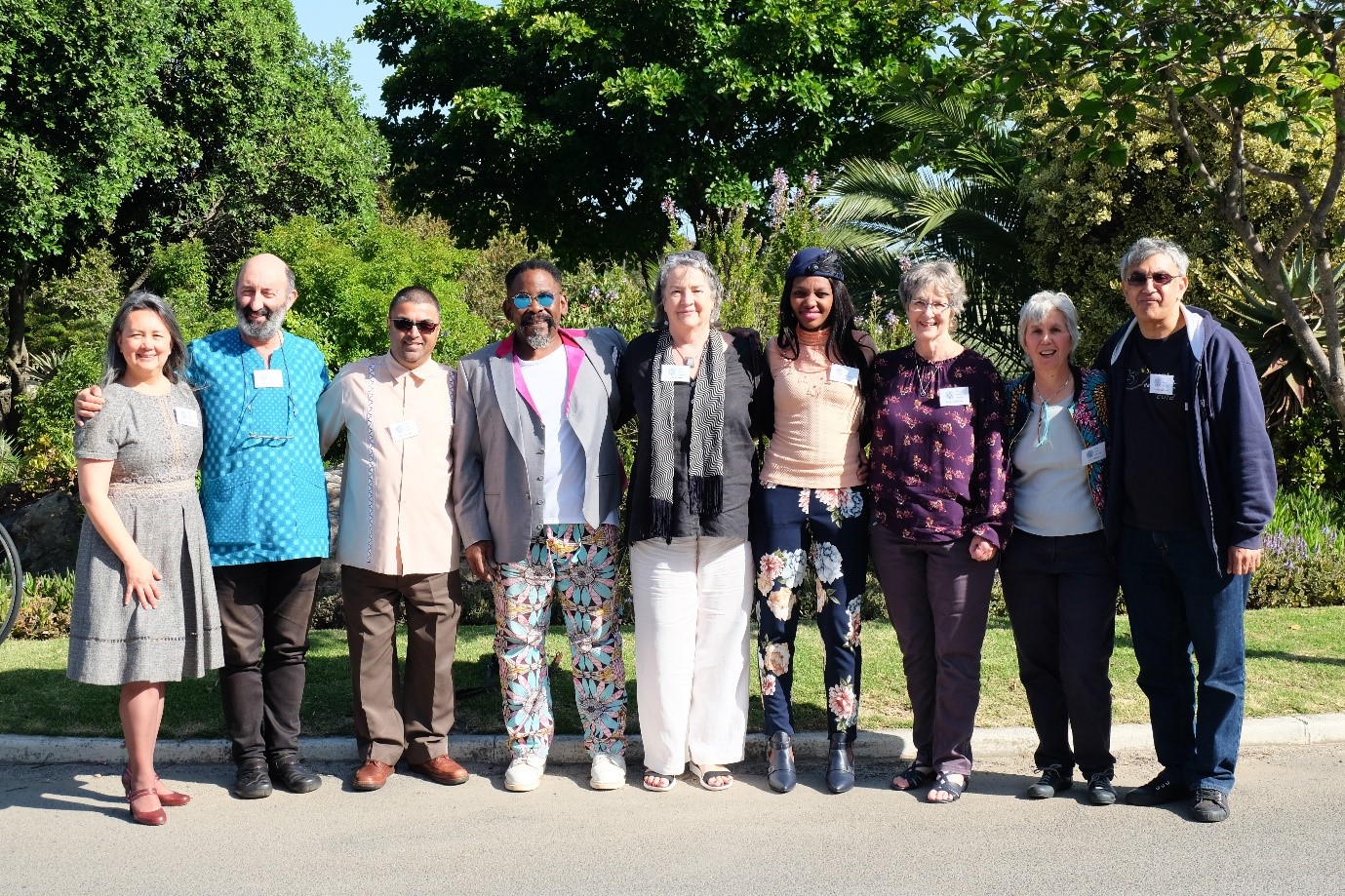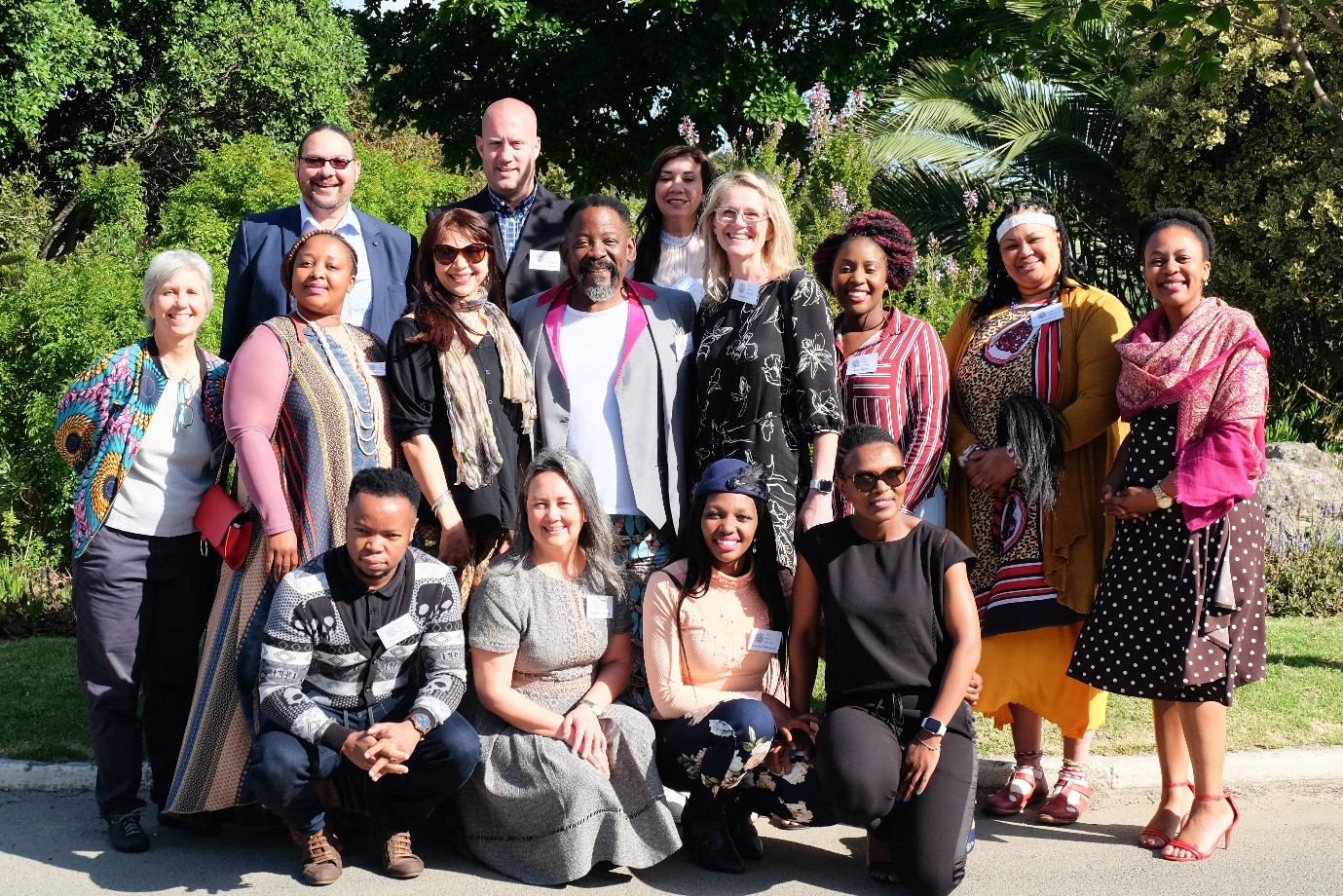The Oliver Tambo Fellowship Programme (OTF), a South African health leadership and management development programme, celebrates 25 years!

The Oliver Tambo Fellowship Programme (commonly known as the OTF), celebrates 25 years of contributing to capacity development of health management and leadership in the health sector. This milestone was celebrated at a gathering of alumni, partners, colleagues and friends and current and past OTF staff at a celebration to mark this special event in November 2019. Attendant was Mr Dali Tambo, son of the late Oliver Reginal Tambo after whom the programme is named.

Members of the class of 1994, with OTF staff and the guest of honour, Dali Tambo
From l to r: Maylene Shung King (1994); Leslie London (1994), Reno Morar (1994), Dali Tambo, Jud Cornell (1994) Precious Nobongoza, Sue Machutchon, Lucy Gilson, Hassan Mahomed (1994)
This makes the OTF the longest running South African postgraduate training programme dedicated to strengthening the leadership capacity of public sector health managers. It has had a primary focus on South African public sector managers, but more recently has also had graduates from the NGO world and from other low-and-middle income countries.
The OTF proudly carries the name of an incredible leader, Oliver Reginald Tambo, who is best known as one of the great leaders of the African National Congress. He is described by all who knew him as one of the most authentic, deeply-introspective leaders, who made everyone feel, through his active listening, as if they were the most important person in the world when in his presence.
First opening its doors in 1994 as a postgraduate diploma in Health Management, Economics and Finance or DHMEF, with an initial cohort of 28 participants, two years later it became, officially, the OTF programme. Since then, the core qualification evolved into a postgraduate Diploma in Health Management and most recently, to a Diploma in Health Leadership, emphasising its current primary orientation towards equipping leaders to navigate and lead in the world of complex health systems.
As currently conceived and managed, we see the OTF programme as itself a health system intervention, not only a career development opportunity for individuals. As a result, we explicitly seek to recruit teams, either in the same cohort or in successive cohorts from areas and facilities. In one of the subdistricts which has consistently sent participants on the course in the last few years, there is a growing team of colleagues working in different parts of the subdistrict hospital, who now work differently and collectively towards the improvement of this facility. We also emphasise the strategy of bringing about system change through ‘small wins’ and recent graduates have very successfully developed small wins that are now adopted for roll-out on a national and provincial scale.
Underpinning the OTF is the understanding that all health leaders need to develop a complementary suite of competencies – so our learning outcomes embrace cognitive, functional and social competencies. Social competencies, which involve understanding of the self and self in relationship to others, is a key stream that runs through all aspects of the Diploma. When managers reflect back on the programme, they often emphasise reflective practice as the most valuable part of their learning journey.
To date, the OTF has graduated more than 200 managers who work at different levels and portfolios in the public health- and NGO sector. Amongst its graduates is the newly-appointed Chief Operating Officer of the University of Cape Town, Reno Morar, who was part of the very first cohort of students in 1994. Others include the current Director General of the National Department of Health, Ms Precious Matsotso; a previous National Director General for Health and then foreign affairs Dr Ayana Ntsaluba, and the Chief Operating Officer of the Western Cape Department of Health, Dr.Keith Cloete.
The core qualification, the postgraduate Diploma, runs over 18 months and takes in a new cohort of participants annually. But as a fellowship, it is also more than a qualification. Critically, OTF alumni form strong and lasting relationships, that have resulted in a network of alumni that interact with and support one another in a variety of ways. An exciting development over the last three years is the extension of our participants and graduates to other LMICs, which include Lesotho, Jordan and Malawi. Applications have been received from numerous other Africa countries-but funding remains a challenge for these prospective participants.
The OTF programme is convened from the School of Public Health and Family Medicine at the University of Cape Town. It was initiated and first delivered by the Health Economics Unit under the leadership of Professor Di McIntyre and is currently located under the management of the Health Policy and Systems Division. Di reminisces that: “The impetus for setting up the postgraduate diploma program was to provide support to newly appointed officials in the health department after the first democratic elections.” Many had little or no formal management experience or training”. She also ruefully recalls that: “One of the things that stuck in my mind was our lack of sensitivity about the trauma that some participants had experienced from their time in jail during the apartheid years … that we happily decided that the GSB would be the perfect venue and then were confronted with the distress of some participants when entering the ‘breakaway rooms’ for small group discussions, that were former jail cells”.
Retired Professor Di McIntyre, the founder of the OTF, remembers that when the OTF was first offered in the Graduate School of Business ( previously a prison), some of the participants who suffered long jail sentences for their anti-Apartheid activism, did not take well to the memories evoked by the break-away rooms in the erstwhile prison cells!-indicating how sensitive the planning and location of teaching venues need to be.
Under the leadership of Professor Lucy Gilson, a health policy and systems expert, the OTF evolved towards a Diploma in Health Leadership, with a strong focus on health systems, policy implementation and complexity. In addition, through engagement with the UCT Graduate School of Business, ‘systems thinking’ became an integral, core part of its orientation and curriculum.
The current convenor, Associate Professor Maylene Shung King, came a full circle from being a student in the programme when it opened its doors in 1994, to assuming convenorship of the programme as it became, officially, a Diploma in Health Leadership.
Earlier convenors include: Elmar Vinh-Thomas, who was the very first OTF convenor and is now with Gates Foundation; Dale McMurchy, Brigid Strachan; Deus Bazira Mubangizi and Helen de Pinho.
The OTF as a programme and its convenors do not work in isolation, but in partnership with colleagues who run equivalent health leadership development programmes, and with National and provincial Departments of Health. Through these partnerships, we look forward to the ongoing strengthening and adaptation of the programme over the next 25 years, as it seeks to continue to contribute to leadership capacity development in an evolving health system.

Members of the current class of 2019, with OTF staff and Dali Tambo (middle row 4th from l)